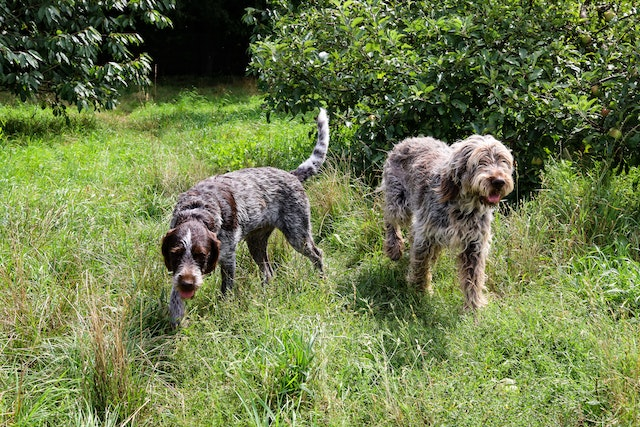
Hey there, fellow pet lovers! Are you wondering if the snake plant is a good luck plant or bad news for our furry pals?
We all want our dogs to be happy and healthy. And for that, you need to make sure that your furry friends are not around plants that are a danger to them.
Well, it's time to dig into the mystery surrounding snake plants and their potential danger to our four-legged friends.
Let's unravel the truth!
What Is A Snake Plant, And Are They Toxic To Dogs?

Here is all you need to know about snake plants:
The Anatomy of a Snake Plant
Snake plants are these popular houseplants known as Dracaena trifasciata. They have a unique appearance and some nifty air-purifying skills. These are a reducer of indoor air pollution and volatile organic compounds.
Picture this: long, sleek leaves that stand tall and proud, with patterns that make them look like they belong in the jungle.
Now, imagine having these bad boys in your home, making it look stylish and fresh. But hold on, what if these are poisonous plants that are toxic for dog buddies?
Dog-friendly or Toxic? Myth Busting
Let's get right to it: Are snake plants toxic to dogs? Unfortunately, the answer is yes. This plant is toxic to dogs.
The ASPCA states that because of snake plants' wild appearance and easy-to-care-for quality, snake plants are amazingly popular indoor plants. But they are also highly toxic plants for your furry friends if consumed and can cause vomiting, nausea, and diarrhea.
Some toxins found in snake plants can be harmful to our dogs if ingested. Snake plants contain saponins, naturally occurring in fruit plants but poisonous for our pets.
It is important to note that deaths from snake plant poisoning are rare. Your dog may experience discomfort and stomach irritation if it consumes snake plants.
While these toxic plants aren't deadly, it's best to keep them out of your dog's reach to ensure their security and happiness.
Signs of Snake Plant Poisoning In Dogs

Here are all the signs that your furry friend has snake plant poisoning:
Understanding the Impact of Saponins on Dogs
We have talked about snake plants' toxic Saponins - a chemical compound that is toxic and harmful to dogs. Let's try to understand what Saponins do.
Saponins are chemicals found in snake plants that are a defense mechanism for the plant, helping fend off pests and diseases.
Suppose a dog ingests any part of a snake plant. In that case, the saponins can irritate the stomach lining and gastrointestinal tract, leading to discomfort and unpleasant symptoms.
The Sticky Situation: The Snake Plant's Sap

Sap, my friends, is the sticky substance in the snake plant. It's like the plant's own version of glue.
If your dog's mouth, curious nose, or playful paws come into contact with the sap of a snake plant, trouble may arise. The sap of the snake plant can also cause skin and oral irritation, swelling, and dermatitis. It may lead to itching and swelling.
Now that we understand the specific compounds in snake plants, let's move on to the toxicity symptoms that indicate snake plant poisoning in dogs.
Snake Plant Poisoning: Symptoms in Dogs
Keep an eye out for these symptoms if you suspect your dog has had an unfortunate encounter with a snake plant:
- Drooling: Excessive drooling beyond the usual dog slobber could be a sign that something's not right.
- Nausea: If your dog suddenly shows signs of nausea, such as restlessness or excessive lips licking, it could indicate snake plant poisoning.
- Vomiting: Unwanted surprises on your carpet? Dog vomits are another common symptom suggesting your dog has ingested something it shouldn't.
- Diarrhea: Loose stools or diarrhea can result from snake plant toxicity, so keep an eye on your dog's bathroom habits.
- Ruptured Red Blood Cells: Snake plant poisoning can lead to severe symptoms due to ruptured red blood cells. This can cause additional complications in dogs and would require immediate veterinary attention.
Diagnosis of Snake Plant Poisoning in Dogs

The veterinarian kicks things off with a thorough physical exam of your dog. They'll carefully assess the dog's symptoms first, checking for any abnormalities in vital signs.
Cracking the Case
Here is what will happen:
-
Vomit Investigation
If your dog happens to vomit while at the clinic, the veterinarian will examine the contents like a crime scene investigator.
-
Sample Sleuthing
If your dog is experiencing diarrhea, a fecal sample may be taken for further investigation. The vet wants to eliminate other causes like excessive intestinal bacteria or internal parasites caused by a snake plant.
-
Blood Work
The veterinarian will perform blood work to get a closer look at how your dog's internal organs are functioning and check for any developing complications. A complete blood count and chemistry panel provide valuable information for a proper assessment.
-
Urine Analysis
If the veterinarian deems it necessary, they may also perform a urinalysis to evaluate kidney function.
What to Expect during Recovery from Snake Plant Poisoning?

The treatment plan addresses the symptoms head-on and gives your pet dog the superhero care they need. Each dog is unique, so the veterinarian will tailor the treatment to suit your dog's needs.
Treating Snake Plant Poisoning in Dogs
When treating snake plant poisoning in dogs, the recovery time depends on the symptoms observed.
Suppose vomiting hasn't occurred or there are remaining toxic snake plant pieces in the stomach. In that case, the veterinarian may induce vomiting. They may even administer activated charcoal to absorb the toxins.
For dogs experiencing vomiting and diarrhea, fluid therapy with electrolytes is initiated to address dehydration and help flush out the toxins. Additional medications, such as antiemetics for uncontrollable vomiting or protective agents for gastrointestinal upset, may be administered based on the dog's specific symptoms.
The treatment is tailored to how pet parents provide relief and support to their furry friends on their recovery journey.
Recovery from Snake Plant Poisoning in Dogs

After the harrowing encounter with snake plant poisoning, let's talk about how to treat these symptoms and what lies ahead for your dog in its recovery:
The severity depends on the amount of toxic substance your dog ingested. Suppose it was a small amount of snake plant, or they managed to vomit what they consumed. In that case, the prognosis for a full recovery is generally reasonable.
Suppose massive or moderately toxic snake plant amounts were ingested or veterinary care was delayed. In that case, the chances of a complete recovery might decline.
To support your pet's healing process, your veterinarian may recommend a bland diet for the next few days. This helps give their stomach a chance to return to normal after the ordeal. It's like providing a gentle reset button for their tummy.
Final Words!

Snake plants may add a touch of elegance to our homes, but it's important to remember that they can pose a risk to our beloved canine companions.
The presence of saponins and other toxic compounds in snake plants can lead to discomfort, gastrointestinal upset, and skin irritations in dogs.
Looking for similar symptoms of snake plant poisoning and seeking prompt veterinary care is crucial for a positive outcome. Prevention is critical, so make sure you stop your dog from eating snake plants.
As responsible pet owners, let's prioritize our friendly pals' safety, well-being, and happiness by staying informed about potential hazards. This applies to both dogs and cats. We can ensure our pets stay healthy, happy, and safe in their forever homes with love, care, and awareness.
We hope you found the answers to your query about snake plant toxicity.


0 comments